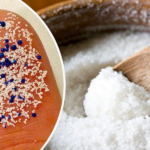Sugar, while adding sweet appeal to food and drinks, can be detrimental to one’s health if consumed in excess. This is because it provides a quick energy boost but also has potential health risks.
Consuming large amounts of sugar over time can lead to insulin resistance and systemic inflammation. This inflammation may cause digestive issues, type 2 diabetes, and other chronic illnesses, negatively impacting one’s quality of life.
According to Vnexpress, the American Heart Association recommends daily sugar intake limits: no more than 6 teaspoons for children and women, and no more than 9 teaspoons for men. They especially advise against any sugar consumption for children under two years old.
Signs You May Be Consuming Too Much Sugar
Increased Hunger and Cravings for Sweet Foods
If you find yourself constantly craving sweet treats, it may be a sign that you’re consuming too much sugar. Over time, your body becomes accustomed to the sweet taste, and the pleasure hormone dopamine is released when you indulge. This, in turn, makes you crave more sugar, creating a vicious cycle. The more sugar you eat, the more you’ll crave it.
Additionally, some sugar substitutes, thought to be healthier options, can actually increase these cravings.
Sugar also leaves you feeling hungry sooner. It’s high in calories but usually lacks fiber and healthy fats, so it doesn’t provide long-lasting satisfaction. Sugar is quickly burned by the body, leaving you hungry again soon after consumption. Moreover, sugar interferes with leptin, the hormone that suppresses hunger, making you want to eat more.
Fatigue and Low Energy
A 2020 study by the University of Kansas linked high sugar consumption to various issues, including inflammation, low mood, and depression. Eating a sugary meal with insufficient protein and fat can cause a rapid spike in blood sugar levels, followed by a quick crash, leaving you feeling tired and hungry again within 30 minutes.
Skin Problems
A diet high in sugar can lead to acne and an increase in wrinkles. Excess sugar can cause insulin resistance, which has been linked to acne development. Additionally, the breakdown of excess sugar produces advanced glycation end products (AGEs), which accelerate the aging process, especially in the skin, leading to the formation of wrinkles.

Dental Issues
Sugar is a favorite food for oral bacteria, and excessive consumption can lead to dental problems such as tooth decay. To prevent dental issues, it’s important to reduce sugar intake and practice good oral hygiene, such as rinsing your mouth after consuming sugary foods.
Instead of reaching for sugary treats, opt for fresh fiber-rich produce, tea, or sugar-free gum to satisfy your sweet tooth.
Digestive Distress
High sugar intake is linked to digestive issues like constipation, diarrhea, and stomach aches. It can disrupt the balance of gut microbiota, leading to metabolic issues and impaired lipid and cholesterol handling. For those who have undergone gastric surgery, excessive sugar consumption can exacerbate conditions like ulcerative colitis, irritable bowel syndrome, and Crohn’s disease.
High Blood Pressure
A 2014 study by Griffin Hospital found a correlation between the consumption of sugary drinks and high blood pressure, increasing the risk of hypertension. High blood sugar can damage the lining of blood vessels, allowing cholesterol to stick to the vessel walls, causing them to harden and leading to elevated blood pressure.



































